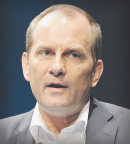Formal discussant of CheckMate 915, Alexander Eggermont, MD, PhD, Chief Scientific Officer at the Princess Máxima Center for Pediatric Oncology, Utrecht, Netherlands, suggested that the lower doses of ipilimumab used in the current study may explain the lack of effect on relapse-free survival.
The dose of ipilimumab (1 mg/kg every 6 weeks) was six times lower compared with previous investigations (3 mg/kg every 3 weeks) that did show a benefit for nivolumab/ipilimumab in the adjuvant setting, including the IMMUNED trial.1
“There has never been proof of a benefit beyond that dosing,” he said, “and I really think this is the problem. We should have learned from the EORTC trial2 that it was enough to give just three to four doses of ipilimumab. That does the trick. Ipilimumab is a remarkable drug and doesn’t need maintenance therapy.”

Alexander Eggermont, MD, PhD
What Next?
Moving forward, Dr. Eggermont believes the paradigm needs to change. “The solution is simple. We need to move to the neoadjuvant nivolumab/ipilimumab combination therapy for two cycles in patients with palpable lymph nodes and macroscopic stage III melanoma and resectable stage IV melanoma. If a pathologic complete response is achieved, further surgery may not be needed.”
Dr. Eggermont continued: “This is the major immunotherapy revolution. Two cycles of neoadjuvant nivolumab/ipilimumab will lead to more cures, shorter treatments, and less surgery. How good can things get? Neoadjuvant therapy is the way to go and is the big breakthrough for optimization of treatment of resectable melanoma.”
When asked whether he thinks there is a future for ipilimumab and nivolumab (anti–CTLA-4 plus anti–PD-1), Dr Eggermont replied: “You bet. It’s within the new paradigm, and it’s going to be the biggest revolution we’ve seen in many years.”
DISCLOSURE: Dr. Eggermont holds stock or other ownership interests in RiverD and Skyline Diagnostics; has received honoraria from BioCad, BioInvent, BioNTech AG, CatalYm, Ellipses Pharma, GlaxoSmithKline, IO Biotech, ISA Pharmaceuticals, MSD, Nektar, Novartis, Pfizer, Sellas Life Sciences, and Skyline Diagnostics; has served as a consultant or advisor to BioInvent, CatalYm, Ellipses Pharma, GlaxoSmithKline, IO Biotech, ISA Pharmaceuticals, MSD, Nektar, Novartis, Pfizer, Sellas Life Sciences, and Skyline Diagnostics; and has participated in a speakers bureau for BioCad, Bristol Myers Squibb, and MSD.
REFERENCES
1. Zimmer L, Livingstone E, Hassel JC, et al: Adjuvant nivolumab plus ipilimumab or nivolumab monotherapy versus placebo in patients with resected stage IV melanoma with no evidence of disease (IMMUNED): A randomised, double-blind, placebo-controlled, phase 2 trial. Lancet 395:1558-1568, 2020.
2. Eggermont AMM, Chiarion-Sileni V, Grob JJ, et al: Adjuvant ipilimumab versus placebo after complete resection of high-risk stage III melanoma (EORTC 18071): A randomised, double-blind, phase 3 trial. Lancet Oncol 16:522-530, 2015.

